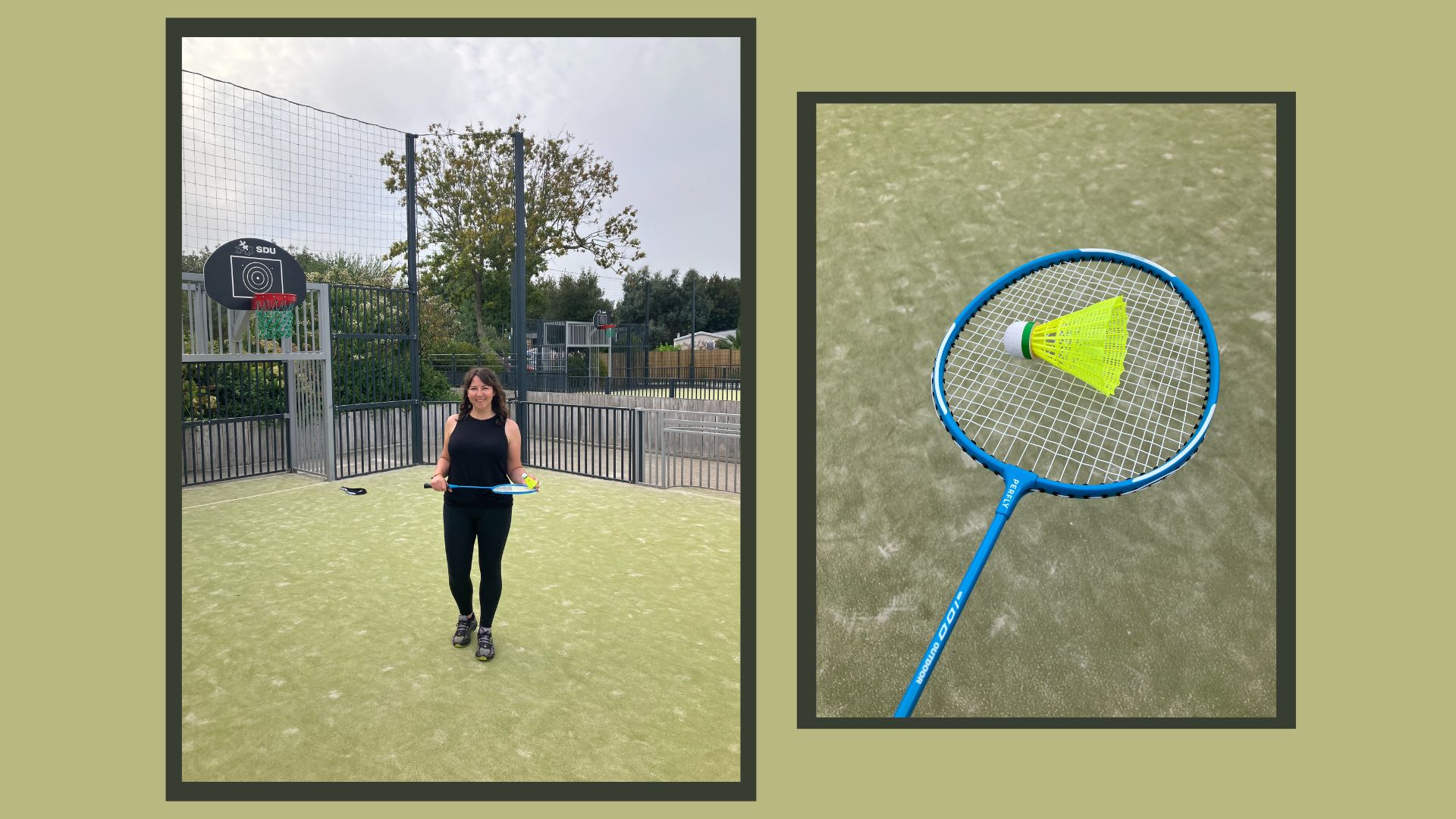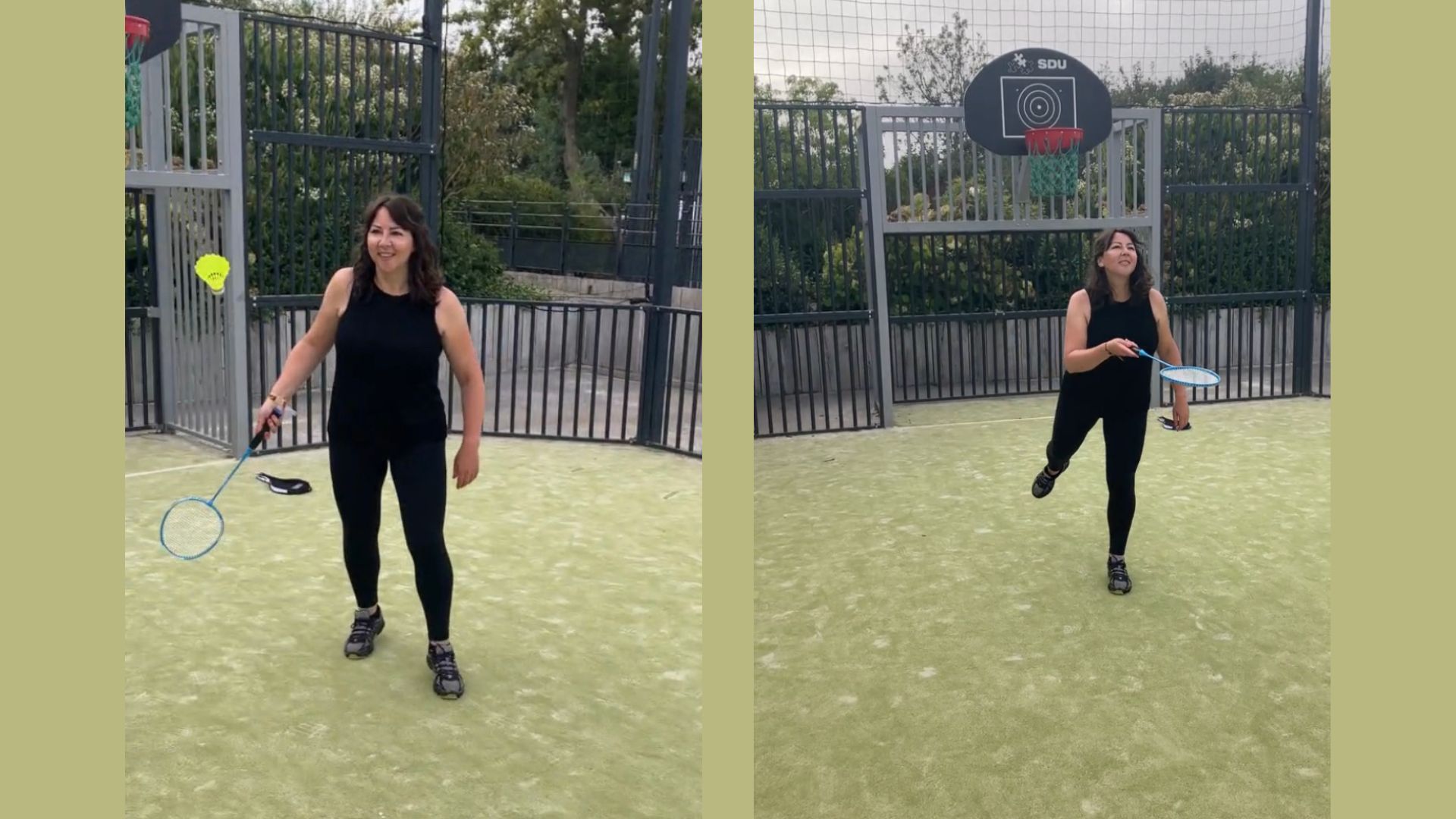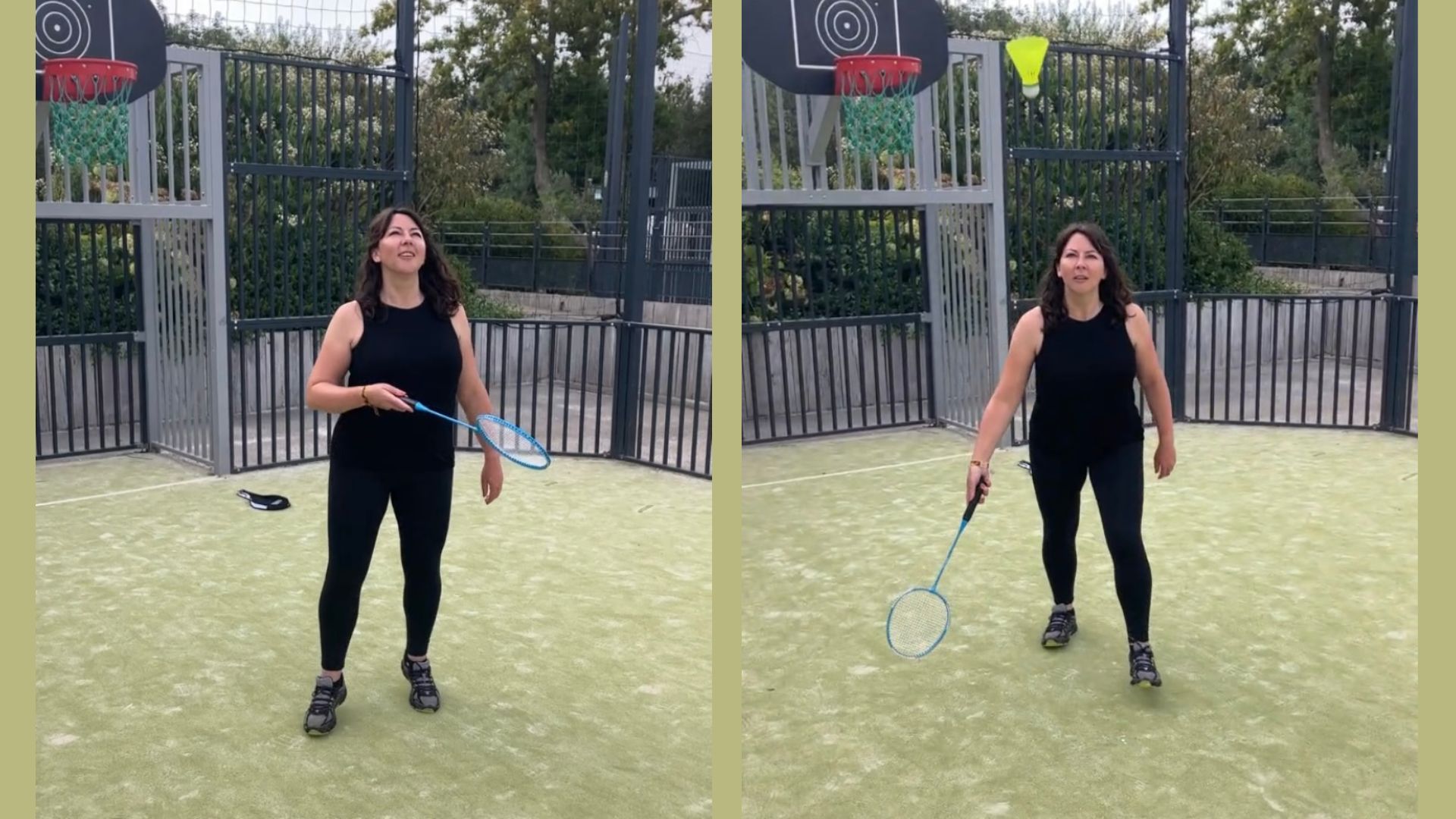I tried badminton for the first time in 30 years - and I can’t believe the benefits
Picking up badminton for beginners is easy, writer and new convert Susan Griffin says, after picking up a racquet for the first time in three decades


Without meaning to sound like the wizened woman at the beginning of Titanic, it’s been 30 years since I played badminton, and I can still smell the sports hall we used for badminton for beginners as a child.
For some reason, I always felt more at ease playing badminton than tennis. Perhaps it is the size of the court (a badminton court is around one-and-a-half times smaller than a tennis court), or maybe it is because you use a shuttlecock, rather than a ball.
While expert players can hit a shuttlecock, or birdie, at more than 200mph, making it the fastest-moving object in sports, it just doesn’t seem as aggressive as a tennis ball, and there is less chance of causing damage to your surroundings - or yourself.
But in truth, although I've dabbled in padel for beginners recently, I hadn’t given much thought to badminton until a family holiday this summer when my dad popped up with the same rackets my brother and I used back in the day. We improvised a net with a line of outdoor chairs in the back garden and enjoyed rally after rally over the week. It was basic but it did the job and even in this simplistic form, badminton brought much joy to three generations of family.
The experience also reminded me that badminton makes a great workout as there's little time to pause - much like pickleball for beginners, I understand. My passion renewed, I bought a beginners’ pack of two shuttlecocks and rackets on my return with the intention of playing more regularly, whether rallies on a makeshift court or more formal matches at the local sports hall.
It also inspired me to explore the physical and mental benefits of badminton. Although it is estimated that more than 300 million people participate in the sport worldwide, and it is one of the biggest draws at the Olympics since its inclusion in 1992, it feels like the advantages and accessibility of badminton are often overlooked.
Benefits of badminton for beginners
1. Badminton can help you live longer
It's a bold statement, but according to the Copenhagen City Heart Study published in the Mayo Clinic Proceedings, racket sports, including badminton, tennis, padel, and pickleball are the most beneficial forms of exercise for longevity with badminton players living 6.2 years longer than average.
Sign up to our free daily email for the latest royal and entertainment news, interesting opinion, expert advice on styling and beauty trends, and no-nonsense guides to the health and wellness questions you want answered.
“Badminton offers a complete workout with cardiovascular fitness, agility, coordination, strength and balance. The sport is fast-paced with many changes in direction, so it is not only physically challenging but also mentally engaging and a sport of strategy as well,” says Linda French, a two-time badminton Olympian and CEO of USA Badminton. So, if you're looking to learn how to get fit and have fun doing it, this could be the sport for you.
According to the Badminton World Federation, the sport’s governing body, you can expect to burn between 475 and 525 calories an hour, make at least 350 changes in direction of 90 degrees or more during 20 minutes of play and raise your heart rate to 80 to 85% of your predicted maximum heart rate, which is ‘significantly higher for that of tennis.’ When compared to how many calories running burns alone, for instance, this is almost on par.
I can vouch it is indeed an all-round workout. There is the running, jumping, stretching and lunging, and because you are so focused on keeping the shuttlecock in play, you won’t realize what a workout badminton is until you stop, breathless and ‘glowing.’
Linda French is the CEO of USA Badminton and a former Olympian. Inducted into the USA Badminton Hall of Fame in 2004, she is the holder of 12 USA National Titles, Illinois High School titles, and both team and individual Collegiate National Titles at both the University of Wisconsin - Madison and Arizona State University. She represented the United States in numerous international competitions throughout her badminton career, including medaling in the Pan American Games in 1995.
In addition to her badminton career as a player, French served as Interim National Badminton Coach at the U.S. Olympic Training Center in Colorado Springs, Colorado, Uber Cup Coach in 1998, and on the USOC Legislative Committee, the Athletes Advisory Council, and the USAB Board of Directors.
2. You'll forget you had a bad day
Sometimes we forget that sport is supposed to be fun - an activity to enjoy either on your own or with friends to move your body in a way that feels good, but the key is the word 'enjoy'. Any sport that takes your mind off the daily grind is a winner and badminton does just that by keeping you on your toes, mentally as much as physically.
Within the blink of an eye, a rally can slow down or speed up, requiring you to adjust accordingly and that takes concentration - and it's fun above all.
“It’s much more than a backyard game," agrees French. "Just like other racket sports, it is a fast-paced game that is both social and competitive."
Playing badminton has brought me as much enjoyment in my 40s as it did when I was a tween, even if my technique or stamina is not what it used to be. I was surprised at how quickly time seemed to fly when I was playing, so I didn't find myself clock-watching as I sometimes do with other activities. I also ended up playing for longer than I intended to as well, reaping the greater benefits for both mind and body.

3. Badminton is a great way to reduce stress
It might sound strange, but badminton just feels really rewarding and that's a great way to combat stress and reduce burnout from work. I think it has something to do with the equipment and motion. Badminton rackets are very lightweight, as are shuttlecocks, which require some force to play hit, offering satisfying sound in return and (if you get it right) a smooth motion over the net.
As Vijay Muthaiah, assistant professor in the Department of Rehabilitation Science in the School of Public Health and Health Professions at the University of Buffalo, noted, “A fast-paced game with a few service smashes is very useful for working through any type of stress you might have.”
There's even research from Radboud University to suggest that moderate to higher intensity exercise, such as badminton for beginners, can actually reduce one of the key symptoms of burnout: exhaustion. Other studies from the University of Lisbon reviewed the link between physical activity and mental health during the coronavirus pandemic and found those who exercised regularly had overall better mental wellbeing - including lower rates of depressive symptoms, stress, and anxiety.
Even as a novice, or if you are very (very) rusty like myself, you will make progress quickly, which instils a sense of accomplishment and confidence with it too. There aren’t many times when I have ventured into gym leggings on holiday, but the lure of badminton did just that, and I loved every minute of it.
Vijaya Prakash Krishnan Muthaiah, PhD, is an assistant professor in the Department of Rehabilitation Science at the School of Public Health and Health Professions at the University of Buffalo. A physical therapist by training, and because of his passion in translational research, he completed inter-disciplinary graduate studies in anatomy-molecular biology.
4. You can play badminton anywhere
In its purest form, you can play badminton anywhere, taking away one of sport's biggest barriers to entry: facilities and equipment. Of course to play 'properly' you'll need a dedicated badminton court, which is typically marked for singles and doubles games. The aim is to hit the shuttlecock, so it lands in your opponent’s half of the court. To win; you must reach 21 points (if it is 20-20, you must win by two clear points and if it reaches 29-29, the first to reach 30 wins) with a match consisting of the best of three. (For more on the rules, visit a dedicated badminton page).
However, one of the most appealing aspects of badminton is that you can play rallies in the smallest and most varied of spaces without fear of windows being broken.
So far, I have played badminton on the beach, on a basketball court, on a camping pitch and in the park. Most of the time, it is just about seeing how long we can keep a rally going, which is enough to raise the heart rate and release the all-important endorphins.

Is badminton easy to play?
As with any sport, badminton can be as complex, competitive and fast-paced as you make it, but essentially, badminton is an accessible form of exercise. The fact we were playing it as a family, encompassing an age range of 10 to 77, is testament to that.
“Badminton is a very inclusive and accessible sport providing opportunities for participation for life for people from different genders, age groups, and with or without physical or intellectual disabilities – truly a sport for all,” says Lloyd Green, head of communications for Badminton World Federation.
It is a sentiment shared by French. “Badminton is truly a lifelong sport. While elite athletes peak in their 20s and 30s, it is a fantastic sport for everyone,” she says.
“For those playing at a recreational level, it is easy to learn the rules, limited equipment is needed, and most importantly it is a great social sport that provides opportunities to build community while staying active. Give the sport a try, and you’ll have a new appreciation when you tune in to watch next summer’s Olympic and Paralympic Games in Paris.
Tips for playing badminton as a beginner
- Don’t overspend: You don’t need to splash out on equipment to play badminton for beginners. There are plenty of beginner sets, typically including two rackets and shuttlecocks, that adequately do the job for less than $50, or try before you buy and rent equipment. Just be sure you've got a good pair of running shoes to help with ankle support.
- Warm-up: Don’t underestimate how much you are likely to be moving about, even during a simple rally. Stretching before (and after) will help - and make sure you are wearing shoes that provide appropriate support. If you need some help, check out our guide on the best stretching apps to get moving.
- Sample for fun: Enjoy badminton for beginners with friends or family in the garden or local park to get a feel for the sport and movement. It won’t feel as pressurized as stepping onto a court.
- Join a club: “For those who have never played beyond the backyard barbecue, it is best to find a badminton club in your area and sign up for an introductory event or lesson,” says French. “Once you learn the rules and are introduced to the basic techniques, you’ll see improvements as you play more.” Look at directories, such as USA Badminton, to find a club near you.
- Practice: Although one of the benefits of badminton for beginners is the social aspect of club life and playing with a partner, or against a competitor, you can also hone your skills by practising at home, by yourself. ‘Keepie uppies’ with a shuttlecock and racket also keeps the mind laser focused.
A journalist with two decades of experience, Susan interviewed A-list names in film and TV before going freelance and focusing on health, wellbeing, and lifestyle features. She has since spoken to world-renowned experts on the most innovative and effective ways to look after your mind and body; her work appearing in publications such as Daily Express, Daily Mirror, Metro, Fabulous and The Telegraph. When Susan isn’t working on her laptop, she is most content hiking in the Peak District or finding quiet camping spots to while away a weekend and knows first-hand the restorative benefits of being outdoors.
